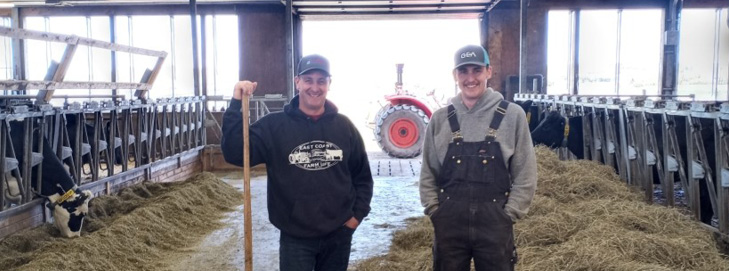Almost thirty years ago, when Nick van Vulpen purchased his farm, Van Vulpen Farms Ltd. in Nappan, Nova Scotia, the farming world looked quite different than it does today. Since the late 1990's, Nick significantly expanded his dairy and beef farming operations by implementing robotic milking systems, doubling his dairy farms' quota and adding a commercial cow calf enterprise to utilize his surplus of land and forages. These are not the only changes he has seen over the last three decades. Growing up on a farm, Nick spent his entire life watching the farming industry adapt to the impacts of climate change. Within the last ten years, he and his son Denzel van Vulpen, a fourth generation farmer, noticed summers in the Maritimes getting hotter and dryer. Nick and Denzel knew they needed to adjust operations to keep up with a rapidly changing environment; something farmers all over Canada are dealing with.
"The world of farming is changing quickly. Farmers are looking for new ways to reduce their environmental impacts and increase efficiency," says Nick.
Adapting sustainable farming practices to stay on top of the changing environment is something Nick was immensely proud to implement on his farm. By doing what he can to reduce greenhouse emissions, he would also see the benefits for his crops.
"I received an email one day about Agriculture and Agri-Food Canada's On-Farm Climate Action Fund (OFCAF). My son Denzel suggested we apply. These practices were already happening on our farm, but this program allowed us to expand and improve them," says Nick.
After applying for OFCAF funding through Perennia Food and Agriculture Corporation, Nick received funding for nitrogen management, rotational grazing, and cover cropping.
Nitrogen management practices helps improve the health of soil and reduce the risk of nitrogen pollution. Operating a dairy and beef farm produces a substantial amount of manure. To better recycle the manure in their fields, Nick purchased a large manure spreader and dribble bar under the OFCAF program. He has since noticed better crops, more yield, and better quality. The more timely use of manure and minimizing nitrogen losses using the dribble bar will be positive for the environment and his farm.
Rotational grazing is a method of grazing livestock. Animals are moved between multiple pastures to allow for more efficient use of forage and better soil health. It prevents overgrazing and allows rest for the growing pasture using intensive management. Under OFCAF funding, Nick put previous training on rotational grazing to practice and expanded his pastures. He is incredibly pleased with the results.
"There is a massive difference in growth for farmers who rotational graze and farmers who do not. Rotational grazing has improved the health of our soil. I really recommend this practice," says Nick.
Nick encourages other farmers to apply to the program as OFCAF gives farmers the opportunities to try something different.
"The program is well funded. It's why all farmers should give it a chance. Any tools the federal government can provide to farmers to encourage further efficiency is very positive for agriculture."
Learn more about On-Farm Climate Action Fund.

Get more Agri-info
- Want more stories like this? Explore what else Agri-info has to offer.
- Interested in reporting on this story? Contact AAFC Media Relations at aafc.mediarelations-relationsmedias.aac@agr.gc.ca to arrange an interview with one of our experts.